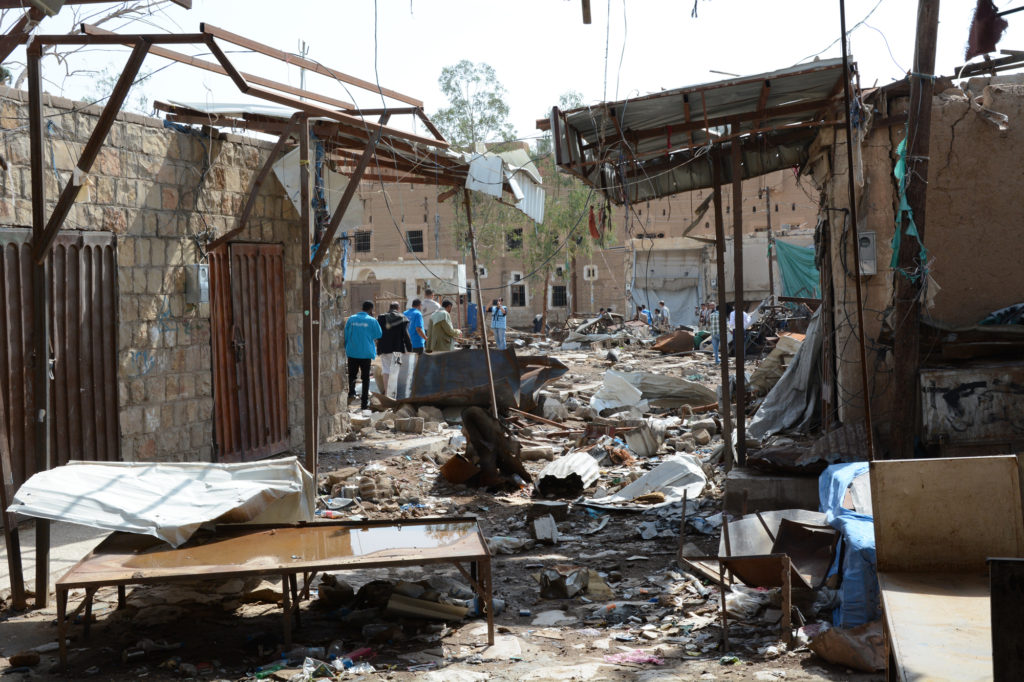Originally published at MintPress News.
WASHINGTON — A State Department spokesperson called for Saudi Arabia to be allowed to investigate itself over airstrikes on a funeral, which is a potential war crime, while simultaneously advocating for an international investigation into Russia’s actions in Syria.
On Saturday, the U.S.-backed, Saudi-led coalition waging war in Yemen bombed a funeral in the capital city of Sanaa. At least 140 people were killed and over 500 others were injured in the airstrike, which human rights experts warned likely constitutes a war crime. Some reports even suggest the Saudi coalition targeted the funeral repeatedly, so as to injure or kill rescuers coming to the aid of the victims of the first airstrike.
BREAKING VIDEO
After 1st Saudi Airstrike on funeral in Yemen, people went in to rescue people, Saudi jets came back for 2nd and 3rd strikes pic.twitter.com/U7Z7WgDx6m— Bassem (@BBassem7) October 8, 2016
Speaking at the United Nations on Friday, Secretary of State John Kerry called on Russia and Syria to face a formal investigation over possible war crimes committed in the Syrian civil war. No similar investigation into Saudi Arabia’s actions in Yemen will be forthcoming, however, according to State Department spokesperson John Kirby, who addressed the issue during a press briefing on Tuesday.
“The strike over the weekend is being investigated, and the Saudis publicly said that they were going to investigate this as – for the potential of it being, in fact, wrongly implemented and wrongly executed,” Kirby said when pressed about the issue by a reporter.
Kirby suggested that the Saudis should be allowed to lead the investigation into their own potential war crime, while reiterating Kerry’s call for Syria and Russia to face international investigations:
I haven’t seen a single case in Syria where the regime or the Russian military, after bombing civilian targets deliberately and indiscriminately, said, “Yeah, we’re going to look into that. We’re not sure that we did that right. We’re going to take a look at it.” Not once. Not once. But the Saudis are and they’re willing to admit that this could have been a mistake and that they’re going to – and they’re going to investigate that.
Watch the State Department Press Briefing – October 11, 2016:
Since the Saudi-led war on the Houthis began in 2015, months after the group took power in the country, numerous reports have shown that the Saudi-led coalition is deliberately targeting civilians and infrastructure in Yemen, using weapons supplied by the United States. Fragments of U.S.-made bombs have already been found at the site of the funeral bombing.
In Syria, too, U.S.-backed rebel forces have repeatedly been accused of war crimes, from beheading children to the use ofchemical weapons. Contrary to Kirby’s assertions that Russia never investigates its own actions, Sergey Lavrov, Russia’s foreign minister, told the U.N. Security Council on Sept 21. that Russia would carry out a “thorough and impartial investigation” into a Sept. 19 bombing on a U.N. aid convoy in Syria.

Documents obtained by Reuters show that U.S. officials were worried about legal blowback from Saudi war crimes in Yemen last year, even as they agreed to a $1.3 billion arms deal with Saudi Arabia. Warren Strobel and Jonathan Landay reported:
State Department officials also were privately skeptical of the Saudi military’s ability to target Houthi militants without killing civilians and destroying “critical infrastructure” needed for Yemen to recover, according to the emails and other records obtained by Reuters and interviews with nearly a dozen officials with knowledge of those discussions.
In an interview on Monday with Democracy Now!, Sarah Leah Whitson, executive director of Human Rights Watch’s Middle East and North Africa Division, called the funeral bombing “a likely war crime” and said U.S. officials were right to be concerned about legal consequences of their involvement.
Whitson concluded:
They have a good reason to fear, because they are implicated in the unlawful strikes that are being carried out by the Saudi coalition. And that’s not just because the U.S. is the primary arms seller to Saudi Arabia and the Saudi coalition member states, but also because it’s actively participating in the conflict by providing targeting assistance to the Saudis and critical refueling support for Saudi planes, without which it’s very clear these strikes could not be taking place.